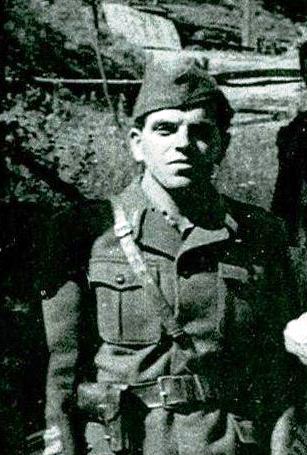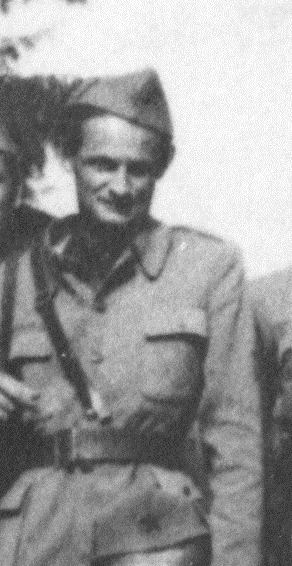
Franc Rozman, nom de guerre Stane or Stane Mlinar, was a Slovene Partisan commander in World War II.

Drastamat Kanayan, better known as Dro (Դրո), was an Armenian military commander and politician. He was a member of the Armenian Revolutionary Federation. He briefly served as Defence Minister of the First Republic of Armenia in 1920, during the country's brief independence. During World War II, he led the Armenian Legion, which consisted of Armenian POWs who opted to fight for Nazi Germany rather than face the brutal conditions of the Nazis' camps.

Hazi Aslanov was an Azerbaijani major-general of the Soviet armoured troops during World War II. He was awarded the Hero of the Soviet Union title twice. The second Hero title was posthumously awarded in 1991, by Mikhail Gorbachev, at the constant recommendations by Heydar Aliyev.

The Serbian Volunteer Corps, also known as Ljotićevci, was the paramilitary branch of the fascist political organisation Zbor, and collaborated with the forces of Nazi Germany in the German-occupied territory of Serbia during World War II.

Ahmad Javad was an Azerbaijani poet who is best known for writing the words of the National Anthem of Azerbaijan used under the 1918–1920 Democratic Republic of Azerbaijan, and again since 1991, and another poem named Chirpynirdi gara deniz. He was later arrested by the Soviet regime and executed on October 13, 1937, accused of trying to spread Musavat-inspired nationalism to young Azerbaijani poets.

The Slovene Home Guard was a Slovene anti-Partisan collaborationist militia that operated during the 1943–1945 German occupation of the formerly Italian-annexed Slovene Province of Ljubljana. The Guard consisted of former Village Sentries, part of Italian-sponsored Anti-Communist Volunteer Militia, re-organized under Nazi command after the Italian Armistice of September 1943.

The Armenian-Azerbaijani war (1918–1920) was a conflict that took place in the South Caucasus in regions with a mixed Armenian-Azerbaijani population, broadly encompassing what are now modern-day Azerbaijan and Armenia. It began during the final months of World War I and ended with the establishment of Soviet rule.

The Russian Protective Corps was an armed force composed of anti-communist White Russian émigrés that was raised in the German occupied territory of Serbia during World War II. Commanded for almost its whole existence by Lieutenant General Boris Shteifon, it served primarily as a guard force for factories and mines between late 1941 and early 1944, initially as the "Separate Russian Corps" then Russian Factory Protective Group. It was incorporated into the Wehrmacht on 1 December 1942 and later clashed with the communist-led Yugoslav Partisans and briefly with the Chetniks. In late 1944, it fought against the Red Army during the Belgrade Offensive, later withdrawing to Bosnia and Slovenia as the German forces retreated from Yugoslavia and Greece. After Shteifon′s death in Zagreb, the Independent State of Croatia, on 30 April 1945, Russian Colonel Anatoly Rogozhin took over and led his troops farther north to surrender to the British in southern Austria. Unlike most other Russian formations that fought for Nazi Germany, Rogozhin and his men, who were not formally treated as Soviet citizens, were exempt from forced repatriation to the Soviet Union and were eventually set free and allowed to resettle in the West.

Lieutenant Mehdi Huseynzade was an Azerbaijani guerrilla and scout during World War II. He was posthumously awarded the title of Hero of the Soviet Union on 11 April 1957.
Azerbaijani National Council was the first delegated legislative body of the Azerbaijan Democratic Republic (ADR) from 27 May 1918 to 17 June 1918 and again from 16 November 1918 to 3 December 1918. It was succeeded by the Parliament, a legislative body formed through nationwide general elections.

The Azerbaijani Legion was one of the foreign units of the Wehrmacht. It was formed in December 1941 on the Eastern Front as the Kaukasische-Mohammedanische Legion and was re-designated 1942 into two separate legions, the North Caucasian legion and the Azerbaijani legion. It was made up mainly of former Azerbaijani POW volunteers but also volunteers from other peoples in the area. It was part of the Ostlegionen. It was used to form the 162nd (Turkistan) Infanterie-Division of the Wehrmacht in 1943. similar to other Ostlegionen, it was organised to replenish the dwindling German manpower on the Eastern front and to "save the German blood at the front."
Mario Reali was an Italian poet and writer and a prominent expert in natural gas and oil. He received the highest Russian decoration of the energy industry: "Meritorious Worker of Gas Industry of Russian Federation", in 1999 and in 2005 from Gazprom.
Novxanı is a village and municipality in the Absheron District of Azerbaijan. It has a population of 4,468. The name means new house in Persian language.
Fuad Hasan oghlu Abdurahmanov was a popular Azerbaijani monument sculptor. He received many awards, including: Honored Worker of Arts of the Azerbaijan SSR (1943), People's Artist of the Azerbaijan SSR (1955), the first Azerbaijani to become a corresponding member of the Academy of Arts of the USSR (1949), and Laureate of the State Stalin Prize two times.

First Partisan battalion Pino Budicin was a military unit of the” Vladimir Gortan” Brigade, 43rd Division of the 4th Army Corps of the Yugoslav National Liberation Army during World War II. The battalion was almost entirely made up of Italians, most of them from the former Italian region of Istria.

Ivan Rukavina was army general of the Yugoslav People's Army, People's Hero of Yugoslavia and politician.
![<i>On Distant Shores</i> 1958 [[Soviet Union]] film](https://upload.wikimedia.org/wikipedia/en/2/2d/On_distant_shores_%281958%29%28poster%29.JPG)
On distant shores is a 1958 Soviet-era Azerbaijani war film. Co-written by Imran Gasimov, Hasan Seyidbeyli, directed by Tofig Taghizade, the film portrays the life of the legendary Azerbaijani guerrilla of the Second World War Mehdi Huseynzade, who fought the Nazi forces in the present-day Italy and Slovenia, hence the film's name On distant shores referring to the Adriatic Sea.

Habibullah Huseynov was an Iranian Azerbaijani Red Army colonel and a posthumous Hero of the Soviet Union. Huseynov emigrated to Baku, working as a loader and a fitter. He was drafted into the Red Army on a Komsomol direction in 1928 and became an artillery officer. He was arrested and imprisoned as an Iranian spy during the Great Purge. He was released months later and became an anti-aircraft artillery battalion commander, serving in this role during World War II.
Shamsulla Faizullah oglu Aliyev was an Azerbaijani Red Army captain and a posthumous Hero of the Soviet Union. Aliyev was posthumously awarded the title on 16 May 1944 for his leadership of a battalion during the Kerch–Eltigen Operation. During the operation, Aliyev's battalion captured the Kerch Metallurgical Plant and reportedly killed 250 German soldiers. He was killed in action a week later on the outskirts of Kerch.

Mehdi Huseynzade Monument - is a monument to the Azerbaijani partisan of the Second World War, Hero of the Soviet Union, Mekhti Huseynzade, and was installed in 1973 in the capital of Azerbaijan, Baku, in the park along the Bakikhanov street near the northern entrance into the city. The sculptor is Fuad Abdurakhmanov, the Peoples Artist of the Azerbaijan SSR, the architect is Mikael Useinov, the Peoples Architect of the USSR.
















